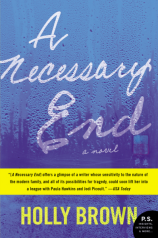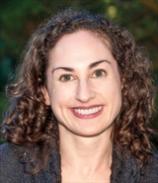Interview: July 15, 2015
Not only is Holly Brown a practicing marriage and family therapist, she’s also the author of the gripping psychological thriller DON’T TRY TO FIND ME. A NECESSARY END is her sophomore effort; it’s a taut, riveting novel of psychological suspense --- a domestic drama full of secrets and twists --- about a woman determined to have a child, her ambivalent husband and a pregnant teenager with a secret agenda of her own. In this interview with The Book Report Network’s Alexis Burling, Brown talks about what’s changed since her debut and how her “day job” influences her writing. She also explains why she enjoys writing (and reading) about complex, not necessarily likable characters and why it’s important for her to stay flexible as her story evolves.
The Book Report Network: At the beginning of A NECESSARY END, Adrienne is obsessed with becoming a mother and adopting a child. She thinks, “Parenthood makes you your best self.” As the writer of that statement, what are your thoughts about its meaning? What does it mean for women or men who choose not to have children? Are they somehow “lesser” individuals?
Holly Brown: I thought for the longest time that I would never have children, so I definitely don’t think that decision makes anyone “lesser.” I’m all for personal choice, and every choice we make shapes us. Parenthood is certainly a transformative undertaking. It can bring out our best, and our worst, and that can vary from moment to moment. I actually think Adrienne’s notion that parenthood is necessary to create a better self is representative of her twisted optimism and a peculiar sort of naiveté --- traits that get her in plenty of trouble.
TBRN: Throughout the book, Gabe and Michael often compete for Adrienne’s attention --- Michael, obviously inadvertently so. As a marriage counselor, is this something you see often in your practice --- parents struggling to compete with their offspring for their spouse’s attention? If so, how do you help your patients work through these feelings?
HB: Marriages can get pretty stressed by having a new family member --- one who’s adorable, sure, but needy as all get out. In therapy, I help couples work through the feelings by expressing them honestly, without shame or blame, and figuring out what they can accept and what needs to change.
TBRN: Gabe acts fairly piggish throughout the book. As a female, how did it feel writing from Gabe’s perspective? Did you channel all your worst fears, or can you empathize with his point of view?
HB: He definitely has his piggish moments, but he has a decent core. He truly loves Adrienne, and the life they had pre-baby, and he’s very afraid of change. There are other reasons for his fear (I don’t want to give away too much here), and that made me empathize with him.
TBRN: Adrienne wants a baby; Gabe could take fatherhood or leave it. Adrienne talks through her emotions; Gabe doesn’t always see what all the fuss is about. How did you go about separating the two from their stereotypes? Was that a conscious choice when shaping their personalities?
HB: I didn’t think of them as stereotypical (Adrienne is definitely not a stereotype of an elementary school teacher, for example). Adrienne is more expressive while Gabe is more taciturn, and she’s obsessed with motherhood while Gabe is ambivalent about fatherhood. It’s the culmination of those elements that makes for a rather combustible situation.
TBRN: Gabe is an avid poker player; you describe a few of his moves in the book. Are you a poker shark, or did you have to hit up David Sklansky’s THE THEORY OF POKER or Dan Harrington’s HARRINGTON ON HOLD’EM to write those scenes?
HB: I’m no poker shark, but I used to play $1/$2 No Limit pretty regularly before my daughter was born. It was a shared hobby for my husband and me, and we both miss it. It’s just much harder to rationalize spending all that money for a babysitter, and four or five hours at the tables. But I had a blast writing those scenes. It was really fun to remember the kinds of personalities we played alongside, and to construct different hands.
TBRN: The first night Leah meets Adrienne and Gabe, she proposes that she has the baby and stays for a year before handing over “the rights” to the child. Isn’t this unorthodox? Does this kind of thing actually happen in the adoption process?
HB: It’s extremely unorthodox, which is why the attorney is advising so strongly against it. But Adrienne can’t do the orthodox thing, even if it is a whole lot safer. She’s a gambler, too, in her own way.
TBRN: It’s clear from the start that Leah intends to drive a wedge between Adrienne and Gabe. She acts differently. She tells each of them exactly what they want to hear. Did you plan what types of clues to drop beforehand that would allude to Leah’s intent without giving too much away?
HB: Some of it was pre-planned, and some of it evolved naturally over the course of a scene, or the course of the book. I like to start writing with an idea of what’s basically going to happen but then allow my imagination to take over once I’m in it. That’s more engaging for me as a writer. I don’t like to stick too closely to a script, even if it is my own.
TBRN: The Patty storyline grows increasingly relevant throughout the novel. During the writing process, when did you realize Patty’s story would become so integral to Adrienne’s development as a character? Did Patty’s influence evolve over time, or was she always a piece of the puzzle?
HB: Patty had always been there, but her extended storyline came through a brainstorming session with my agent and editor after I’d already completed a draft of the book. I was really excited because it just seemed right; it already worked with the characters I’d established.
TBRN: Adrienne is obsessed with watching Summer Jackson’s reality TV show about a former prosecutor who covers missing person’s cases. DON’T TRY TO FIND ME also involved a missing person’s case of sorts. Was that an intentional nod to your debut? What captivates you about the subject matter?
HB: I’m not that meta! That missing persons link hadn’t even occurred to me. But I do think it’s gripping subject matter. Wondering about where they went involves backtracking to the life they had before. So it’s a perfect little mystery.
TBRN: A NECESSARY END is similar to DON’T TRY TO FIND ME in that each of the characters are easy to panic and not particularly noble in their actions or selfless in their motivations. Would you agree with that assessment? What do you enjoy about creating such complex, conniving individuals? Is writing a book with “likable” characters important to you?
HB: I don’t think about likability in a traditional way. I like characters who fascinate and entertain me. I like to be surprised. I enjoy reading that, and I enjoy creating it. The vast majority of people are not noble or selfless, especially when what they want most is on the line. Now, would everyone act as Adrienne, Gabe and Leah do? Of course not. That’s what makes it a diversion from reality. That’s what makes for summer reading.
TBRN: A NECESSARY END covers traditionally female subjects: pregnancy, breast pumping, packing diaper bags. Would you consider yourself a writer of “women’s fiction,” or do you think that label is a bunch of hogwash?
HB: I have no problem with the label “women’s fiction,” though I don’t think it’s the most apt one for what I’ve written. “Domestic suspense” or “psychological thriller” is closer.
TBRN: Gabe’s brother Michael’s suicide is a minor, but nonetheless important, plot development that affects each of the characters. As the creator of this scenario, do you blame Adrienne or Gabe for what happened to Michael? Don’t they also exhibit unhealthy behavioral tendencies? What role does mental illness play in A NECESSARY END, and how does it shape the evolution of each character throughout the book?
HB: I’ve always liked the definition of mental health as psychological flexibility and adaptability. By that standard, no character in the book is emotionally healthy, and that drives much of their behavior. I don’t entirely blame Adrienne or Gabe for what happened to Michael because they were all young and self-involved (Michael’s suicide could be seen as the ultimate self-involvement). But we all bear some responsibility when we treat others badly.
TBRN: The ending of the book is quite a shocker! Did other endings wind up on the cutting room floor during the writing process?
HB: Nope. That one just came to me and felt right, and I went for it. Fortunately, my editor agreed.
TBRN: A NECESSARY END is your sophomore novel. Was the writing process different the second time around? The publishing process? Did you make any changes in your routine that proved fruitful?
HB: The writing process was a lot more fun this time, especially channeling Adrienne. She’s a spitfire, that one. It was also much more relaxed because when I wrote DON’T TRY TO FIND ME, I didn’t have an agent or a book deal. With A NECESSARY END, we sold it with about a hundred pages written. So that took a load off. But as for the routine itself, it was largely the same: I sat down on my prescribed days and wrote until I had to pick up my daughter at preschool.
TBRN: In addition to being a published author, you are a marriage and family therapist. How does your “day job” influence your writing content? How about your writing schedule?
HB: As a therapist, I’m steeped in human nature all day long. I pay a lot of attention to how people think, how they feel and how they behave. That, of course, comes into play when I’m creating characters. I practice therapy three days a week, and write at least two of the other days, maybe more.
TBRN: What are you working on next?
HB: It’s another psychological thriller about seemingly ordinary people pushing each other to the brink. I’m enjoying it, though I have to say, I miss hanging out with Adrienne and Gabe.








